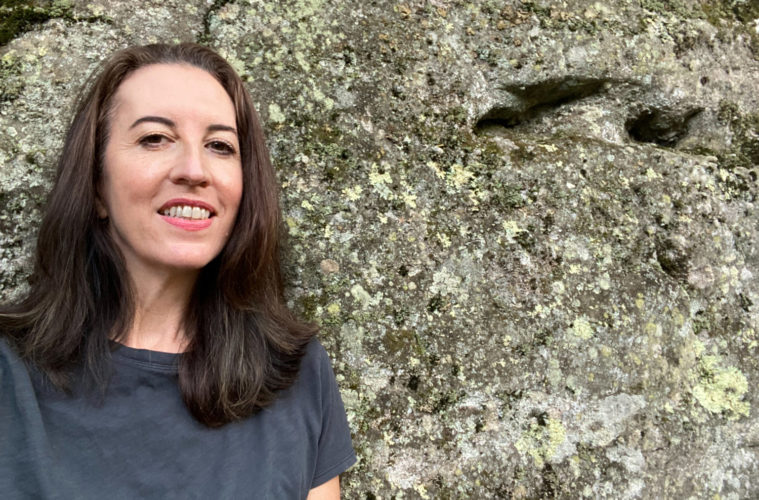
Jess Irish is artist, filmmaker, and writer who practices cross-genre, collaborative new media with a focus on environmental justice and the expansive potential for technology to create a more equal society. She was the founding co-director of OnRamp Arts, a collaborative tech-forward creative non-profit operating in Echo Park from 1998-2002. Since then Irish has focused her work on the intertwining potential of digital/data systems and filmmaking as materials for the meta-narrative storytelling that the complexities of a dangerous and hyperconnected world require. Her new short film This Mortal Plastik screens on October 28 at L.A. Live, as part of the Awareness Film Festival.

Jess Irish: Still from This Mortal Plastik
L.A. WEEKLY: When did you first know you were an artist?
JESS IRISH: I drew a pretty fantastic drawing of myself as “a girl bug” when I was two, which seems pretty apt. But the proposition of “being an artist” happened around twelve when I found a book on the letters van Gogh wrote to his brother. I remember staring at the studies he made for hours and feeling transported to a way of seeing. I recognized this was not the way the rest of the world values seeing, and it struck me as a mystery worth exploring. The idea that you could just build an expansive view around a common, ordinary thing has stayed with me, and also saved me.

Jess Irish, For While (2019)
What is your short answer to people who ask what your work is about?
The subject and medium of my work change, but my approach is one of “lyrical nonfiction” where I bring together disparate elements in new ways. In the last five years, I’ve focused on making experimental documentary shorts. While I’ve worked in “new media” for the last 25 years, my thinking around “what is possible” connects to the shifting nature that computational systems opened up for me, even when I’m working in analog media like poetry or painting. We cross-pollinate, sort, filter, extract, mediate, and connect ideas all the time, and doing this in a visual and textual way is endlessly engaging for me.

Jess Irish: Still from This Mortal Plastik
What would you be doing if you weren’t an artist?
I often experience intense envy of underwater cinematographers or people who spend a lot of time with animals in the wild. To me, this seems a much more compelling way to discover new realities or spaces than trying to fly to the moon as the billionaire men are doing. But a more lucrative job would be to be a house flipper, which is something I’ve had fun doing for myself. I like finding a gem in the rough and figuring out the process to physically transform it into something lovely.
Did you go to art school? Why/Why not?
For college, I knew I wanted to study art but wanted to be in a broader experience of study, the liberal arts in particular — psychology, history, philosophy. I’m still of this mindset, and currently consider myself a student of science and poetry in equal measure. But what matters more is the stance of being a student, to always find the opportunity to seek new understandings. This is why I love teaching, it forces you to be an active participant and ambassador for learning as a practice.

Jess Irish: This Mortal Plastik
When is/was your current/most recent/next show or project?
The Los Angeles premiere of my new documentary short film This Mortal Plastik is on October 28 at L.A. Live, as part of the Awareness Film Festival. I made it during the lockdown period of the pandemic; it’s a poetic and personal take on the world’s most impersonal substance: plastics. How do you make such a ubiquitous and banal subject interesting? But, it really is, for better and worse. It’s our pandemic inside the pandemic. That research prompted a new series of plankton portrait paintings I’m doing now. Plankton are largely invisible to the human eye, but collectively generate over half the oxygen we breathe!. I’m also starting a dynamic (data-driven) project that uses the form of the cento poem to revisit manifestos of the future posited at the beginning of the last two centuries.

Jess Irish: Still from This Mortal Plastik
What artist living or dead would you most like to show or work with?
That is such a hard question to answer. I would definitely choose a dead artist since the idea of time travel would be part of the experience. I’d love to work with Dziga Vertov, who made one of my favorite experimental films, Man With a Movie Camera in 1929 in the early years of the Soviet revolution. It’s so inventive and gorgeous. But ideally, I’d also hitch a train and drink coffee with other artists and writers working and sharing in that utopian and curious time that crossed genres and broke norms.
Do you listen to music while you work? If so what?
I confess to being a fan of the Spotify “discover weekly” algorithm — it’s really so helpful. I love discovering new music, and making playlists for specific activities in my creative process (hiking, browsing, researching, drawing, etc). But when I write, it’s only Philip Glass. I have a writing playlist that works like Pavlov’s dinner bell — it launches me into the writing mode. He’s also a personal hero of mine, and is still active and collaborating now, in his eighties.
Website and social media handles, please!
Instagram: @j.essirish
Twitter: @jirish

Jess Irish: Phantasmagoria



